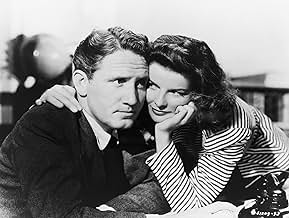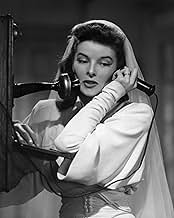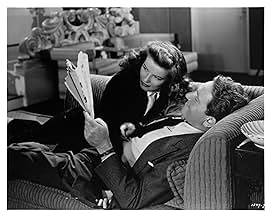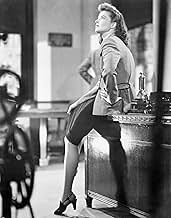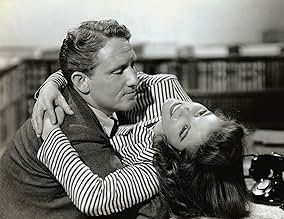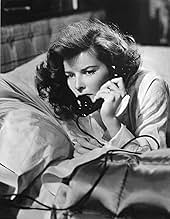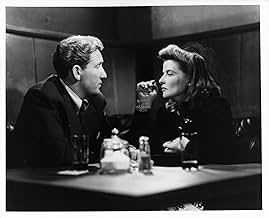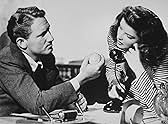Adicionar um enredo no seu idiomaSportswriter Sam Craig and columnist Tess Harding, with the same New York newspaper, overcome their initial antagonism, fall in love and get married, only to find their relationship strained... Ler tudoSportswriter Sam Craig and columnist Tess Harding, with the same New York newspaper, overcome their initial antagonism, fall in love and get married, only to find their relationship strained when he comes to resent her hectic lifestyle.Sportswriter Sam Craig and columnist Tess Harding, with the same New York newspaper, overcome their initial antagonism, fall in love and get married, only to find their relationship strained when he comes to resent her hectic lifestyle.
- Direção
- Roteiristas
- Artistas
- Ganhou 1 Oscar
- 5 vitórias e 2 indicações no total
- Dr. Lubbeck
- (as Ludwig Stossel)
- Cab Driver
- (não creditado)
- Stage Doorman
- (não creditado)
- Phone Girl
- (não creditado)
- Baseball Fan
- (não creditado)
- Direção
- Roteiristas
- Elenco e equipe completos
- Produção, bilheteria e muito mais no IMDbPro
Avaliações em destaque
Tess and Sam meet when they have a war of words in their articles over baseball, and when the editor tells them to make up, that is when they begin seeing each other. Now Tess doesn't hide how busy she is, or how full her apartment often is of people from all over the world that she knows, yet Sam marries her and I get the feeling that he is disappointed that nothing changes. Their wedding being practically a drive through affair should have given him a hint.
So naturally the marriage eventually fails when Sam walks out. That is Tess' first surprise. Her second surprise is when the woman she has patterned herself after for years and years, Ellen Whitcomb (Fay Bainter), makes a totally unexpected, but not unwelcome, move. How does this all work out? Watch and find out.
I'm not sure this film is ultimately sexist or feminist. It does look like the script was trying to paint Hepburn's character as an ice queen, and she just acted her way out of being portrayed in that fashion. She ultimately plays it as a person who, if she takes up a task, goes all the way with it, right down to the humorous scene where she tries to make breakfast and acts like every utensil in the kitchen is from another planet, yet she persists in the face of hilarious adversity and inexperience. However, if you turn the roles of Sam and Tess around, you could say this was a feminist film, maybe giving men a dose of their own 1942 medicine when they expected women to just live with whatever work schedule the man had, even if they sat home alone at nights.
I'd highly recommend this as one of the great romantic films, and they didn't make many of those during WWII outside of Casablanca.
This isn't to say that the film is without flaws. Far from it. The writing is clipped and most of the words on their own have little spark. (It takes Spencer Tracy's glowering eyes, or Katharine Hepburn's radiant smile, to add life to those words.) Even the relationship between Sam and Tess isn't set up in the most fluid of ways, leap-frogging from moment to moment, from scene to scene, without quite making the necessary connections--if you believe in Sam and Tess together (and I do), it's only because you can truly believe in Tracy and Hepburn together. The film occasionally feels like a play cobbled together from various scenes, until it hits its stride midway through the film (after Sam and Tess get married).
Script aside, the plot is interesting, and certainly quite radical for its time. However, the ending (a hilarious set-piece of comedy though it might be) leaves things largely unresolved. We have a wonderful, strong female character in Tess Harding--this is clear enough in the first half of the film. But her strength, her forceful personality and go-getting attitude, become her weakness in the second half, so much so that she becomes almost a caricature of the original Tess Harding. Some of the things she does (her 'humanitarian' wholesale adoption of Chris, for example; her rudeness and blithe ignorance of Sam's worth) are truly reprehensible, and the point the writers are making is clear--a female who tries too hard to be a male loses her feminity, and cannot ever really be fulfilled. In this sense, the gender politics, as other commenters have pointed out, is 'deplorable'.
And yet there is a grain of truth in it; if one *can* be brought to believe that Tess could really treat Chris and Sam in the way she does, one can't help but applaud Sam's decision to leave. The role reversal is almost complete--Sam himself comments on the fact that she 'makes love' to him to smooth over their quarrels. She charges on her own merry way without asking him about his life, his opinion, or anything that remotely matters to him. Their union was neither perfect, nor a marriage, as he justifiably charges.
The uneasy tension between the admirable and the deplorable Tess Hardings comes at the end: you most certainly get the impression that the film itself didn't quite know whether or not to affirm the Tess character. In fact, by all accounts (even Hepburn's own), the film originally ended with an unqualified affirmation of Tess's character--promising to be more involved in her husband's life, Tess is depicted at a baseball game, cheering alongside Sam, getting louder and louder and rising higher in her seat above him. It was both an affirmation of Tess the character, and a lingering question mark about the Harding-Craig reunion.
Test audiences didn't like it. (Apparently, it was the *women* who felt threatened by the character Hepburn portrayed on screen. She was too strong, too beautiful, too *everything* all at once.)
What transpired in the end, then, was a re-shot ending that muddied the moral of the film in suggesting that women could not really be fulfilled without their men. Sam wants her to be Tess Harding Craig; she wants to be Mrs. Craig; she wants to change; he thinks (and probably knows) she can't. The logical ending would have seen Tess, cast as she had been in the traditional masculine role, wooing Sam back, only to cast doubt over whether her atypical (for the time) strength as a female would unequivocally threaten the typical male figure as embodied in Tracy's character. The original ending would have better borne out the logic of the film--a valuable DVD extra if ever there was one. You can perhaps applaud the spirit of the film, without accepting the fact that it seems to let that spirit fade away in the end.
So what is there of worth in WOMAN OF THE YEAR, with its original ending gone, and its revolutionary potential muted by a slapstick scene in a kitchen with exploding waffles, too much coffee, and a woman who just can't seem to figure out how to separate eggs? Well, the answer is simple, and it's already been given. This is a movie to watch, and to watch *again*, because it is the first cinematic pairing of Spencer Tracy and Katharine Hepburn. For a couple of hours, you're allowed to watch these two great, mythical actors playing two people in love... while falling in love themselves. That is most certainly a rare privilege, if ever there was one.
Hebpurn: Well, we're alone. Talk. You do have something to talk about? Tracy: Yeah, yeah. You. You. I'd like to know what you like and don't like, and how you feel about being you. Hepburn: I feel very good about it. Always have. I like knowing more about what goes on than most people. Tracy: And telling them. Hepburn: Yeah, and telling them.
Last 45 minutes: 5 stars. The film starts unraveling with Hepburn's rash decision to adopt a refugee, not because that's a bad thing (it's a great thing), but because she does so without telling her husband, or without the slightest thought to actually caring for the child. It spirals from there until that horrific prolonged ending scene, where this intelligent, brilliant woman fumbles around in the kitchen, apparently not knowing how to use a toaster. It's, quite frankly, god-awful on every possible level.
The message is loud and clear: if a woman chooses to focus on a career, she will neglect her husband, not have a clue about raising kids, and be incompetent at performing wifely tasks like making breakfast. It's terribly insulting, and undoes a lot of the great things it did in the first 70 minutes. Hepburn's character wins the "Woman of the Year" award, but it's ironically Tracy who is showcased as award-worthy, for having put up with the "difficult case" of his wife, remained level-headed, and taught her a good lesson in what it takes to have a good marriage.
The only small saving grace is that his character suggests she can have both, a career and a family, as long as she doesn't go to extremes in either. It's only too bad the film didn't simply show us how women can do this balancing just as well as men, but it was 1942, and a lot of people - including those in powerful positions - were simply not ready for this message.
I think that's what the authors of the screenplay Michael Kanin and Ring Lardner, Jr., had in mind in the script as well. As mismatched a pair if there ever were, he a down to earth sports columnist and she a world famous news reporter and commentator, fall in love.
As her celebrity is much wider known than his, Hepburn expects to have it all her own way. The rest of the film is concerned with their efforts to adjust to each other.
Katharine Hepburn's character is based on liberal radio commentator and reporter Dorothy Thompson. Not surprising that no one has mentioned that yet in all the reviews so far. The giveaway is Tracy first hearing her voice on the radio while in his favorite sports bar on Information Please where Thompson was a guest. Her career petered out after World War II, so she's not known to today's audience.
Writers Kanin and Lardner had as a model for the Tracy character Lardner's own father. Ring Lardner was one the celebrated sports writers of the first half of the 20th century, a great reporter and humorist. While Tracy is not as witty as Ring Lardner, he is definitely as down to earth.
My favorite scene is Spencer Tracy trying to feel comfortable at an international gathering at her place, looking even for people who speak English. Of course she's equally as uncomfortable at William Bendix's bar where Tracy likes to hang out.
Hepburn, comfortable in her celebrity, just sails through life, getting awards here and there. When she thinks of a Greek orphan kid she gets pressured into taking in as another award, that's when Tracy puts his foot down.
Based on some real celebrities, Tracy and Hepburn become those celebrities in the flesh. It's an awesome debut for what turned out to be a great screen team.
Look for fine performances by William Bendix, Fay Bainter, Minor Watson and Dan Tobin. Kanin and Lardner copped the film's only Oscar for an original screenplay. Hepburn was nominated for Best Actress, but lost to Greer Garson in Mrs. Miniver.
If Woman of the Year were remade today, the producers might consider making the woman the sports reporter. Seeing Jeannie Zelasko covering the World Series this year, I'm sure it would work very well.
Você sabia?
- CuriosidadesKatharine Hepburn refused to reveal who wrote the screen play to Louis B. Mayer until after he bought the project from Hepburn. Hepburn was afraid that Mayer would low-ball the two authors (Michael Kanin and Ring Lardner Jr.) because, at the time, they were both relatively unknown.
- Erros de gravaçãoIn the kitchen, Tess uses a vacuum coffee maker (Cona). However, if she had put the coffee in the bottom of the coffee maker and the water in the top, as shown, it wouldn't have made coffee at all.
- Citações
Tess Harding: [In the stands at the ballpark, observing the large crowd in attendance] Are all these people unemployed?
Sam Craig: No, they're all attending their grandmother's funeral.
- Versões alternativasThere is an Italian edition of this film on DVD, distributed by DNA Srl: "LA DONNA DEL GIORNO (1942) + INCANTESIMO (1938)" (2 Films on a single DVD, with "Woman of the Year" in double version 1.33:1 and 1.78:1), re-edited with the contribution of film historian Riccardo Cusin. This version is also available for streaming on some platforms.
- ConexõesFeatured in George Stevens: A Filmmaker's Journey (1984)
- Trilhas sonorasBridal Chorus (Here Comes the Bride)
(1850) (uncredited)
from "Lohengrin"
Written by Richard Wagner
Played on an organ at the wedding
Principais escolhas
- How long is Woman of the Year?Fornecido pela Alexa
Detalhes
- Data de lançamento
- País de origem
- Idiomas
- Também conhecido como
- Uma Mulher Muito Importante
- Locações de filme
- Empresa de produção
- Consulte mais créditos da empresa na IMDbPro
- Tempo de duração
- 1 h 54 min(114 min)
- Cor
- Proporção
- 1.37 : 1



